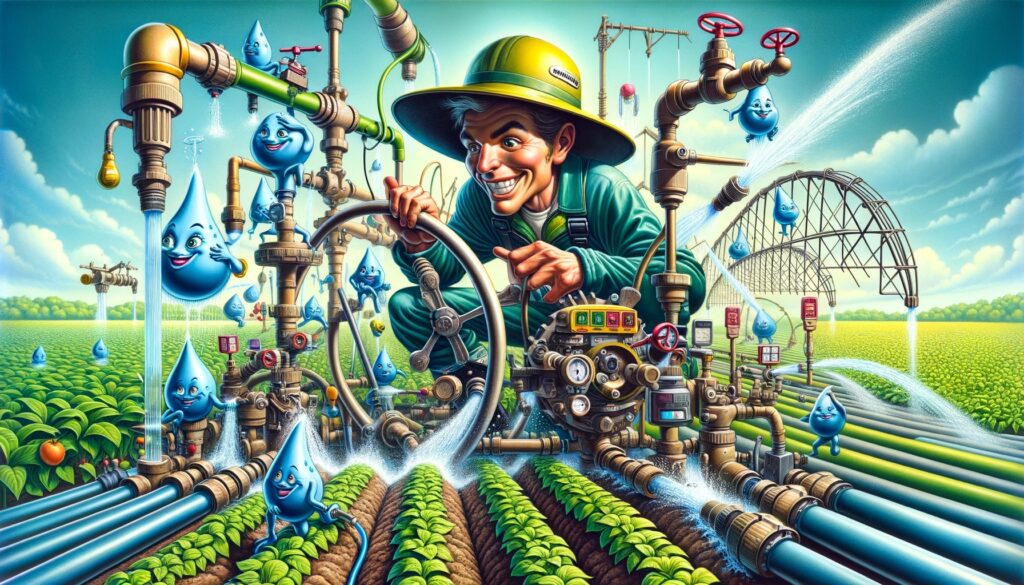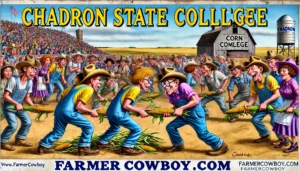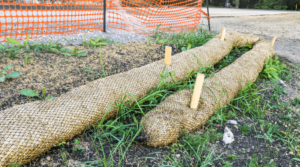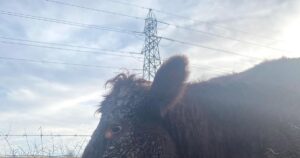
Farmer Cowboy A vibrant and detailed close up illustration in a contemporary Mad Magazine style. The scene humorously depicts a farmer managing water resources on a1.jpg
Water Woes: When Farmers Mistake Their Fields for Water Parks
From Rain Dances to High-Tech Hydration, Farmers Navigate the Slippery Slopes of Irrigation with a Mix of Old School Tactics and Over-Engineering
Managing Water Resources on the Farm: Best Practices
Introduction: A Soggy State of Affairs
In the heartland of agriculture, managing water resources is not just about survival; it’s about creating a spectacle. With techniques ranging from ancient rain dances to state-of-the-art smart systems, today’s farmers seem to be preparing more for an audition on a reality show than actually growing crops. We dive into the sometimes-muddy waters of agricultural water management to uncover just how our food suppliers are making more waves than a hurricane.
The Eternal Rain Dance
At the break of dawn, Farmer Joe, whose ancestors were likely drought-deniers, performs a ritual that looks more like a Zumba workout gone wrong. According to Dr. H2O, a self-proclaimed Water Whisperer from the University of Atlantis, “The Rain Dance hasn’t been scientifically proven, but it has been shown to increase morale, and sometimes that’s half the battle.” Public opinion, gathered from a local coffee shop, suggests that 85% of town residents believe the dance is as effective as any weather app—both are right only half the time.

The Innovators – When Technology and Crops Collide
Moving from traditional to trendy, some farmers equip their fields with more gadgets than a Silicon Valley startup. Farmer Tech, known for consulting his iPad more often than the sky, claims, “These apps keep my crops so connected they could start their own social media network.” Critics argue that while his crops are digitally savvy, they’re no less thirsty. Economic analysis suggests that Farmer Tech might spend more on data plans than on seeds.
The DIY Wetlands – Accidental Environmentalists
In an unexpected twist, Farmer Fred, after leaving his sprinkler system on overnight, woke up to a new ecosystem. What was once a potato field became a potential UNESCO wetlands site overnight. “I was going for lush, but ended up with marsh,” Fred comments wryly. Environmentalists praise these new habitats as serendipitous conservation efforts, while economists calculate the cost of aquatic potato farming.

The Bucket Brigade – Back to Basics
Some farmers, rejecting modernity, have embraced the ancient art of the bucket brigade. Eyewitnesses report seeing lines of farmers passing buckets down the field, a method so old it’s almost revolutionary. Social science researchers from Farming University suggest this method promotes community spirit and is a good cardio workout, though it does little for actual irrigation. Public surveys indicate a growing nostalgia for these “simpler times,” though no one is volunteering to join the brigade.
The Over-Compensators – When Enough is Never Enough
Then there’s the Over-Compensator, a farmer who, in a single season, installed three dams, six ponds, and a water slide for his corn. Political analysts argue that such measures might be his way of securing votes for the upcoming Farm Council elections under the “more is more” platform. Economically, it’s a boon for local water park contractors but a bust for agricultural efficiency.

The Old Guard – Sticking with the Classics
On the other side of the field, we have the farmers who use irrigation systems so ancient, archaeologists frequent their fields more than agricultural inspectors. “It’s vintage, not obsolete,” argues Farmer Ancient, whose water channels are rumored to have been built by the Romans. Historical experts add that these systems are less about irrigation and more about preserving heritage, providing a curious blend of farming and museum tourism.
The Scarecrow Chronicles – A Soggy Tale
Our final water management technique involves a scarecrow so waterlogged it has its own ecosystem. Positioned beneath a perpetually leaking irrigation pipe, this scarecrow has become a local celebrity. According to Dr. Crow, an ornithologist who now studies scarecrows, “This particular figure provides both a habitat for wildlife and a cautionary tale about water wastage.” It’s a political satire in itself, mocking the inefficiency seen in much larger bureaucratic systems.
Conclusion: A Fluid Future
As we’ve waded through the muddy waters of farm water management, it’s clear that while the methods may vary, the goal remains the same: keep the crops alive without turning the farm into an accidental theme park. Whether through high-tech solutions or age-old traditions, it seems that when it comes to irrigation, some farmers are just making it rain, in one way or another.

Educational Observations on Managing Water Resources on the Farm
1. The Rain Dance
Why bother with modern irrigation when you can just perform a rain dance? It’s cheaper, counts as exercise, and let’s be honest, it’s just as likely to work as your average weather forecast.
2. The Overly Optimistic Farmer
There’s always that one farmer who thinks his crops can be watered on positive thoughts alone. Spoiler alert: thoughts don’t water crops, water does.
3. The Hose Wrestling Match
Ever watched a farmer try to untangle a hose? It’s like watching an amateur wrestle with a giant water snake. Who needs pay-per-view when you have this free entertainment?
4. The Mysterious Vanishing Ponds
Monday: the pond is full. Wednesday: it’s half gone. Friday: Was there ever a pond? It’s the Bermuda Triangle of the farm.
5. The Accidental Swamp Creator
That moment when you leave the sprinklers on overnight and accidentally create a new wetland. Bonus points if you attract a new species of frog.
6. The High-Tech Farmer
This farmer uses more gadgets and apps to water his plants than NASA used for the moon landing. Yet, somehow, the plants still look thirsty.
7. The Bucket Brigade
Forget modern technology; some farmers still prefer the old-school method of watering crops one bucket at a time. It’s not efficient, but it’s a great workout.
8. The Eternal Optimist
The dam is broken, the well is dry, but this farmer is still sure there’s a hidden water source somewhere. Spoiler: It’s called a water truck, and it charges by the hour.
9. Rain Gauge Roulette
Farmers who get overly competitive about rain gauge readings. It’s like they’re betting on horse races, but with precipitation.
10. The Drought Denier
No matter how dry it is, this farmer refuses to admit there’s a drought. “It’s just a really long dry spell,” he says, as his crops turn to dust.
11. The Water Whisperer
This farmer talks to water like it’s going to respond. “Please go to the west field today.” Sure, and maybe the water will do your taxes too.
12. The Over-Compensator
One dry spell and this farmer turns his farm into a water park. Slides and lazy rivers are fun, but let’s remember the corn doesn’t need a wave pool.
13. The Ancient Egyptian Irrigation System
Using an irrigation system so old, it’s practically an archeological site. It’s more ‘historical artifact’ than ‘helpful farming tool’.
14. The Rain Collector
Farmers who try to set up elaborate systems to catch every last drop of rain. It looks less like a farm and more like a plumber’s nightmare.
15. The Soggy Scarecrow
That one scarecrow that’s always positioned under the leakiest part of the irrigation system. He’s less of a scarecrow and more of a sponge.
Disclaimer
The events depicted in this article are satirical. Any resemblance to actual persons, living or dead, or actual events is purely coincidental. This piece is intended for humorous purposes only and should not be taken as factual advice or scientific analysis. The characters and scenarios mentioned are fun creations from the minds of a collaborative duo—a cowboy and a farmer—who are entirely human and have whimsically fabricated these tales without any interference from artificial intelligence. Please enjoy this read with a grain of salt and a healthy appreciation for the absurd.
Originally Published at FarmerCowboy.com
2024-07-05 10:22:41
Originally posted 2024-07-07 09:27:28.
Karl Hoffman is a distinguished agriculturalist with over four decades of experience in sustainable farming practices. He holds a Ph.D. in Agronomy from Cornell University and has made significant contributions as a professor at Iowa State University. Hoffman’s groundbreaking research on integrated pest management and soil health has revolutionized modern agriculture. As a respected farm journalist, his column “Field Notes with Karl Hoffman” and his blog “The Modern Farmer” provide insightful, practical advice to a global audience. Hoffman’s work with the USDA and the United Nations FAO has enhanced food security worldwide. His awards include the USDA’s Distinguished Service Award and the World Food Prize, reflecting his profound impact on agriculture and sustainability.






